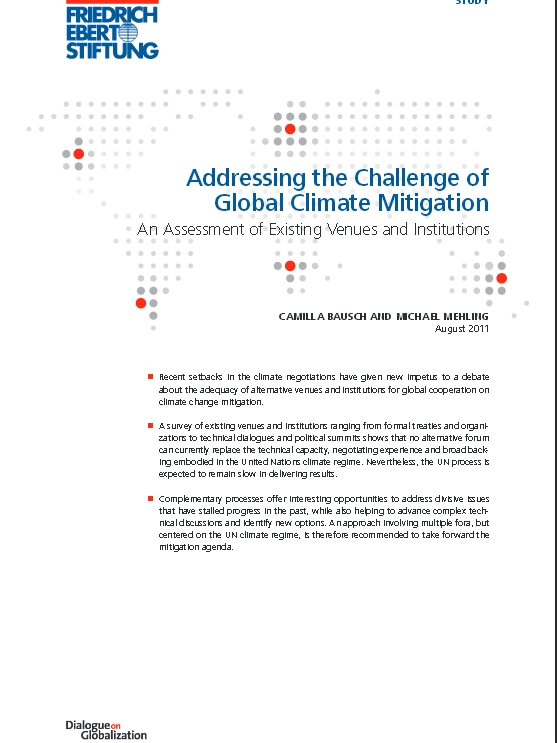Addressing the Challenge of Global Climate Mitigation
An Assessment of Existing Venues and Institutions
- Publication
- Citation
Bausch, Camilla and Michael Mehling 2011: Addressing the Challenge of Global Climate Mitigation – An Assessment of Existing Venues and Institutions. Friedrich Ebert Stiftung (FES), Global Policy and Development, Berlin.
Recent years have seen the climate negotiations under the United Nations Framework Convention on Climate Change fail to achieve a major breakthrough on climate change mitigation, and no such breakthrough is expected in the near future. In a study commissioned by the Friedrich Ebert Foundation, Dr. Camilla Bausch and Michael Mehling evaluate various venues and institutions addressing the climate challenge, and assess their influence on the future of global mitigation efforts. The study is available for download.
While the UN climate negotiations were able to advance a number of issues over the last few years, they face diplomatic stalemate on an increasing range of issues relevant for successful climate change mitigation. At this point in the negotiations, an outcome conducive to ambitious climate change mitigation seems increasingly elusive: expectations for agreement on a comprehensive and legally binding treaty at the upcoming climate summit in Durban this December are rather modest.
A number of alternative venues and institutions have therefore emerged to address various aspects of the climate challenge. This includes the G8 and the G20 as well as the Major Economies Forum (MEF), the Cartagena Dialogue, and others. In their paper, the authors analyze the prospects and promise of the UN negotiations and alternative processes, including the conditions under which these might complement, obstruct or even obviate each other.
Drawing on a set of essential criteria that would need to be met for successful mitigation, the authors conclude that no alternative forum can currently replace the technical capacity, negotiating experience and broad backing embodied in the United Nations climate regime. Still, they anticipate that the UN process will remain slow in delivering results, and hence suggest that complementary processes offer interesting opportunities to address divisive issues and help advance complex technical discussions. An approach involving multiple fora, but centered on the UN climate regime, is therefore recommended to take forward the mitigation agenda.
The paper [pdf, 2.7 MB, English] can be downloaded.




